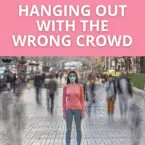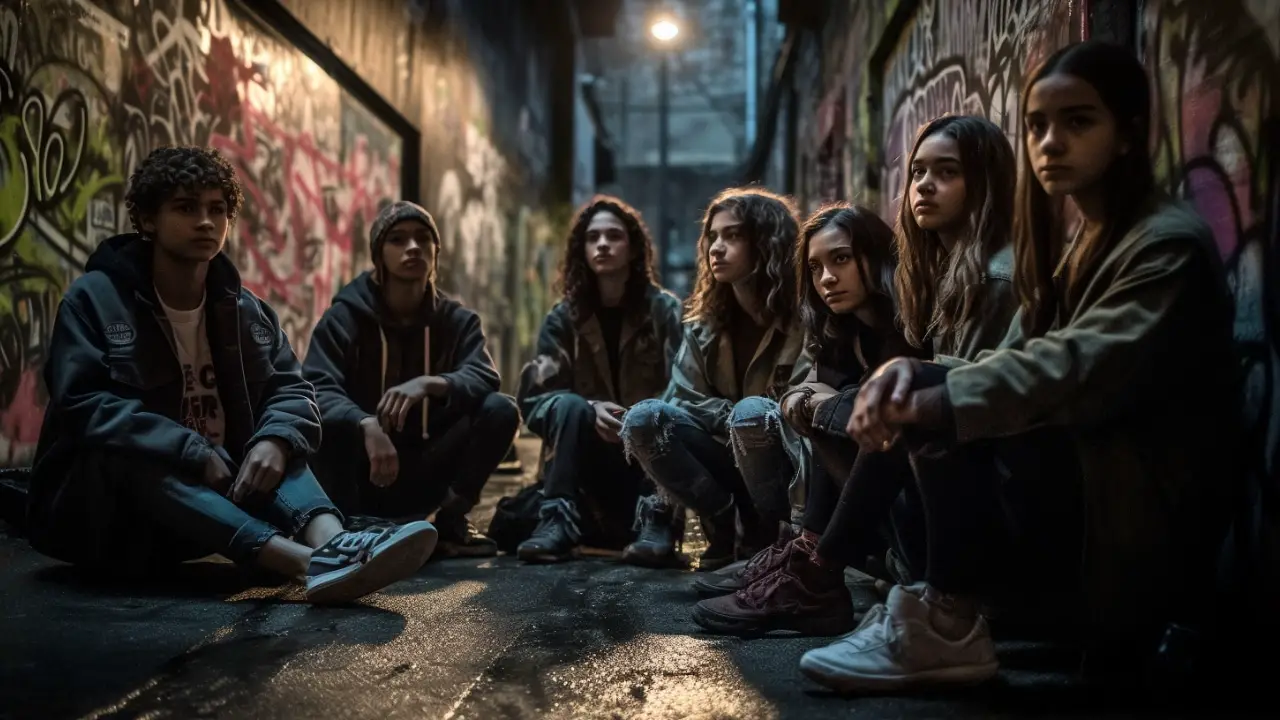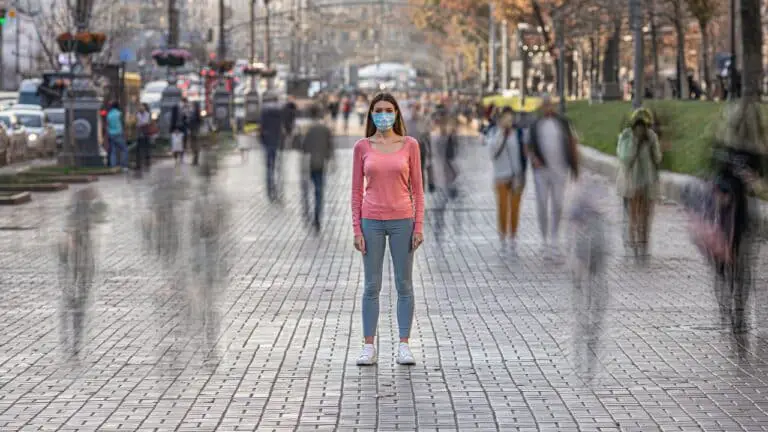
In every society, individuals are shaped by their environment and the people they interact with daily. This interaction is especially critical during formative years when identity and character are being developed. One influential factor in this development is the company we keep, which can lead us down a path of positivity and growth or one of negativity and stagnation. This article focuses on the latter, delving into the concept of hanging out with the “wrong crowd,” a term often used to describe a group whose influence fosters harmful behaviors and attitudes.
While the individual effects of associating with the wrong crowd are well-documented, it’s essential to take a step further and look at the broader societal impact. How do these negative influences ripple out, affecting families, communities, schools, and even our economy? By taking a closer look, we aim to shed light on this issue, increase awareness, and spark conversations about prevention and intervention. Let’s start by understanding what constitutes the “wrong crowd” and why people often find themselves ensnared in its grasp.
Understanding the Concept of the ‘Wrong Crowd’
The term “wrong crowd” is somewhat subjective, as it can depend on one’s perspective and cultural, societal, or individual norms. However, in general terms, the ‘wrong crowd’ typically refers to groups that encourage harmful, destructive, or anti-social behavior. This could include activities such as drug use, delinquency, or a lackadaisical approach towards responsibilities and societal norms. It’s essential to note that being part of the ‘wrong crowd’ doesn’t inherently make someone ‘bad’ — it’s the destructive behaviors and attitudes nurtured within the group that cause concern.
So why do individuals, especially young ones, fall in with the wrong crowd? The reasons are multi-faceted and often intertwined. Some may be trying to fit in, especially during adolescence when peer approval is highly sought after. Others might be seeking an outlet for rebellion, dissatisfaction, or curiosity. A lack of positive role models or the presence of difficult home conditions can also contribute to an individual’s susceptibility to negative influences.
Understanding this complexity is the first step towards tackling the societal impacts of hanging out with the wrong crowd. The more we know about why people gravitate towards negative peer groups, the better we can devise strategies to divert them towards more positive influences.
Societal Impact of Hanging Out with the Wrong Crowd
The societal impact of individuals associating with the wrong crowd is far-reaching and multidimensional. It permeates various facets of society, from personal development and family dynamics to community safety and economic prosperity.
A. Impact on Individual Development and Behavior
Individuals hanging out with the wrong crowd often exhibit significant changes in behavior, reflecting the negative influences of their peer group. This could manifest as a decline in academic performance, increased truancy, disregard for societal norms, or involvement in illegal activities. Over time, these behavior patterns can limit personal growth and future opportunities, leading to cycles of negativity that can be hard to break.
B. Influence on Family Dynamics
The impact extends to families, creating tension and strain as parents and siblings grapple with the changes in their loved one’s behavior. In some cases, it can lead to breakdowns in communication, increased conflict, and emotional distress for all members of the family.
C. Consequences for Local Communities
On a community level, the presence of ‘wrong crowds’ can foster a sense of unease and insecurity. This is particularly evident in cases where these groups are involved in illegal activities, contributing to higher crime rates and community unrest.
D. Effect on Schools and Education
Schools are often significantly impacted. The disruptive behavior can create a challenging learning environment, affecting not only the individuals involved but also their peers. Schools may also face reputational damage and increased strain on resources as they try to address these issues.
E. Economic Implications
Finally, there are economic implications. The lack of constructive engagement and the potential for legal troubles can limit employment prospects for those involved with the wrong crowd, contributing to economic inequality and lost potential. Additionally, communities may face increased costs associated with crime prevention, rehabilitation programs, and social services.
In the next section, we’ll delve into real-world examples through various case studies to further illustrate these impacts.

Case Studies: Real-World Examples of Societal Impact
For a more concrete understanding of the societal impacts of hanging out with the wrong crowd, we’ll explore a few real-world case studies. These scenarios are a mix of anonymized personal stories and community-level occurrences that demonstrate the broad-ranging effects.
A. Case Study 1: Individual and Family Impact
Our first case involves a high school student named John, who began hanging out with a group involved in recreational drug use and petty crimes. John’s academic performance plummeted, and his relationship with his family strained as he started lying and showing aggressive behavior. This not only caused emotional distress to John and his family but also impacted his future prospects as he struggled to get into college.
B. Case Study 2: Community and School Impact
In a small midwestern town, a group of teens engaged in vandalism and shoplifting created an atmosphere of unease among residents and local businesses. The local high school also experienced a surge in truancy and instances of bullying, creating a negative environment for other students and taxing the resources of school administrators.
C. Case Study 3: Economic and Societal Impact
On a larger scale, we can look at urban neighborhoods with high rates of gang activity. These areas often grapple with increased crime rates, leading to decreased property values, businesses leaving the area, and heightened costs related to law enforcement and social services. Moreover, the young people involved in these activities often face limited job prospects, contributing to a cycle of poverty and crime.
These case studies are just a snapshot of how the societal impact of hanging out with the wrong crowd can manifest. It’s essential to remember that every situation is unique, and individuals, families, and communities all have the potential to break these negative cycles with the right strategies and support. In the next section, we’ll discuss some interventions and preventative measures.
Addressing the Issue: Prevention and Intervention
The societal impact of hanging out with the wrong crowd is a complex issue that requires a multi-pronged approach. The goal should not only be reactive, dealing with the problems once they’ve already occurred, but also proactive, focusing on prevention and early intervention.
A. Education and Awareness
Educational programs that promote awareness about the consequences of negative peer influence can be incredibly effective. Schools, community organizations, and even families can utilize such programs to teach young people about the potential risks and how to resist peer pressure.
B. Positive Role Models and Mentoring
Having positive role models can significantly influence young people’s choices. This could come in the form of teachers, coaches, community leaders, or mentors who can guide youth and provide them with constructive examples of how to navigate life’s challenges.
C. Community Engagement and Extracurricular Activities
Engaging youth in community services and extracurricular activities can provide them with a positive outlet for their energy and creativity. It can also foster a sense of belonging and purpose, reducing the allure of negative peer groups.
D. Family Support and Communication
Open lines of communication within families are crucial. Parents and guardians need to be aware of their children’s social circles and be ready to intervene if they notice changes in behavior. Family support can also provide a safe environment for children to express their concerns or fears about peer pressure.
E. Social and Economic Initiatives
At a societal level, addressing economic and social inequalities can help mitigate the conditions that often lead to the formation of the ‘wrong crowd’. Access to quality education, job opportunities, and social services can all contribute to creating an environment where negative peer influence is less appealing.
Addressing the societal impacts of hanging out with the wrong crowd is no small task, but with coordinated efforts, it’s a challenge that can be effectively managed. The key lies in fostering positive influences, strengthening communities, and ensuring support systems are in place to guide individuals who may be susceptible to negative peer pressure.

Final Thoughts
The societal impact of hanging out with the wrong crowd is a pressing issue that requires our attention and proactive efforts. We’ve explored how associating with negative peer groups can lead to adverse consequences, affecting individuals, families, schools, communities, and even the economy. However, it’s important to remember that there is hope and the potential for positive change.
By focusing on prevention and intervention strategies, we can break the cycle of negative peer influence. Education and awareness programs, positive role models, community engagement, and strong family support all play crucial roles in steering individuals away from the wrong crowd. By addressing social and economic inequalities, we can create a more inclusive society that reduces the allure of negative influences.
It’s imperative that we continue to work together as individuals, families, communities, and institutions to provide support, guidance, and opportunities for those at risk of falling in with the wrong crowd. By doing so, we can help individuals realize their full potential, foster safer and more harmonious communities, and create a brighter future for everyone.
Let us strive for a society where positive peer influence prevails, empowering individuals to make choices that align with their values and aspirations. Together, we can make a difference and build a stronger, more resilient society.







